|
|
| 'Like' us on Facebook | Follow us: |
Posted on: June 01, 2015
Sathya Sai Speaks - 90th Birthday Special
Spiritual Education is Education
18 November 1975
When the Lord comes in our midst there are two important aspects to His descent that stand out among others. One is His powerful and enchanting presence, which has the potency to transform and raise all who comes to Him. Everyone who comes to Him benefits, some considerably and few immensely, depending on one’s receptiveness. The other aspect is the message that He brings, and this has some unique benefits of its own. Adherence to the message has the power to manifest the Lord in one’s life. A tryst with Divinity could be a blessing for good acts of the past, but it is in loyalty to the message that one completely benefits and finds redemption, and also a means to express one's devotion to the Lord. So it is indeed of paramount importance for each of us to dwell on His message.
As part of the 90th Birthday offerings, we will begin every month with excerpts of a discourse from the Golden Jubilee Birthday Celebrations of Bhagawan. During the grand 50th Birthday celebrations, Baba gave discourses specific to the Seva wing and the Bal Vikas wing, apart from discourses revealing His own message and mission. The excerpts presented below are from the discourse Baba gave on 18 Nov 1975 as part of the Bal Vikas Guru's Conference. Let us listen and re-listen, read and re-read even as we imbibe the essence contained.
Even as yet another academic year begins in Prasanthi Nilayam, it would be appropriate to take a dip in this Divine Discourse delivered on 18 November, 1975 where Swami delineates on what true knowledge is. A striking trend we notice these days which was not quite common a decade ago is the extensive advertising by educational institutions, indicating that education is increasingly becoming a commodity, or an asset which is an effective money making tool. Even if one were to overlook for a moment the Divinity of Bhagawan, it has to be conceded that His contribution to the field of education has been immense. Tens of thousands of students have graduated from schools and colleges set up by Him. No doubt they have left with secular degrees that shall help them find fine means of existence, but along with that, the sacred impulses that urge one to seek the very purpose of existence too have been planted in their fertile young minds.
Who can be considered a truly educated person? What completes education? These questions can be answered if we know the true purpose of education. In this discourse Swami speaks on this very theme. In fact Bhagawan begins this discourse with a rhetoric poem that raises these very questions.
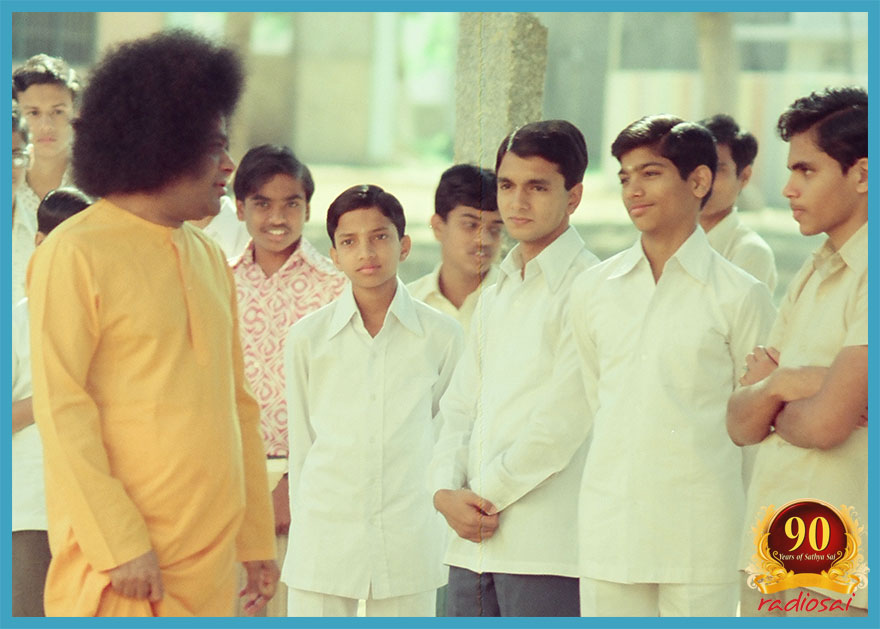 |
Can all those who can read be called educated? Are all those who have acquired college degrees educated? Without wisdom and discrimination can any learning (vidya), be real education? If one acquires education only for eking out a livelihood, and it has no spiritual background can that be called education?
Isn’t it beautiful how Bhagawan answers the question in the question itself? Wisdom and discrimination is what completes education. If education does not leave one with a better discrimination, and stronger so as to follow the right path that has been discerned, definitely the purpose of education is not achieved. But is it merely worldly discrimination that enables one to make better choices? Or is it that, the purpose of education is to grant something beyond even human existence? Swami explains using the meaning of the Sanskrit word, ‘Vidya’.
It has been said, 'Spiritual education is education, and that which is devoid of spirituality cannot be called education.' In the word 'Vidya' (Education), when the root word, 'Vid' joins the word, 'Ya' the word 'Vidya' is formed. 'Ya' stands for, 'that which gives', 'Vid' for 'illumination'; So the inner meaning is - that which illumines is Vidya or education. Regard ignorance as darkness and spiritual knowledge and wisdom as light; we know that where there is light there can be no darkness (just as where there is Brahma Jnana or Spiritual knowledge there can be no Ajnana or ignorance), it clearly indicates that true Vidya can only be Brahma Jnana. The various kinds of education and knowledge are like different rivers, whereas spiritual education or knowledge is like the ocean. Just as all the rivers go and merge into the ocean, all kinds of education and knowledge too merge into the ocean of spiritual knowledge. When all these rivers merge into the ocean, they lose their individuality and attributes, and acquire the nature of the ocean itself. Hence spiritual knowledge is the best and the most significant of all types of knowledge.
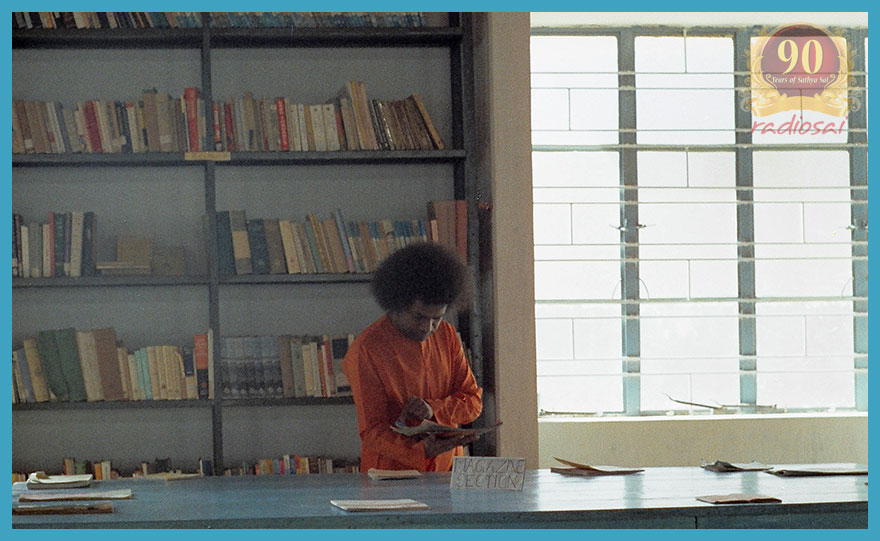 |
Most of us have studied subjects that we hardly put to direct use in our present careers. We have doctors who become government officers, engineers who become musicians or students of commerce and economics who become sportsman. Does that mean, in such cases, our education was futile? It isn’t, because what education equips us with is not a handful of academic subjects, but it empowers us with the art of learning; the art of seeking knowledge, pursuing and achieving it. So one who keeps seeking is bound to be led to the spiritual, as all questions can find most fulfilling answers only in the subtle realm. May be that is why we refer to these fields in education as ‘streams’! As Bhagawan put it beautifully, all fields of learning must merge in the ocean of spiritual knowledge, losing their individuality, and granting the ultimate wisdom.
Reaching Brahma Jnana may be the purpose of education, the culmination. But when do we recognise that our quest is becoming more spiritual than worldly? Is there a way we can ascertain for ourselves? Let us see what Swami has to say in the following part of the discourse.
However much educated one may be, if the education acquired is devoid of self-knowledge and self-confidence, it is utterly useless. We should not seek education merely to eke out a living. Even those uneducated sustain themselves. Mere sustenance or survival is not what is important; knowledge of the Divine (Brahma Vidya) is important. A foolish person is he who acquires all education and becomes learned, but does not ever understand who he is. Such a person, however much he may be educated, he will not be able to give up his mean qualities. Through all his education he will only acquire the skill of logical argumentation, but not true knowledge. Why should one keep acquiring knowledge and trudge towards death, instead one must acquire that knowledge which will help transcend death.
What is the use in studying subjects that does not lead you to the knowledge of who you are? Every individual keeps asking the other, “Who are you, where do you come from?” We go about trying to gather such unnecessary news and facts. But no one seems to be trying to find out the answers for the questions, “Who am I? Where do I come from and what is my reality?” What does one gain by knowing about others, while being ignorant about one's own self? The one who is ever in pursuit of the 'news' outside will have nothing but 'nuisance' within. So we must not make any attempt to know what is outside us. One who has recognised the strengths within, one who has grasped one's own essence, will with ease understand the world outside.
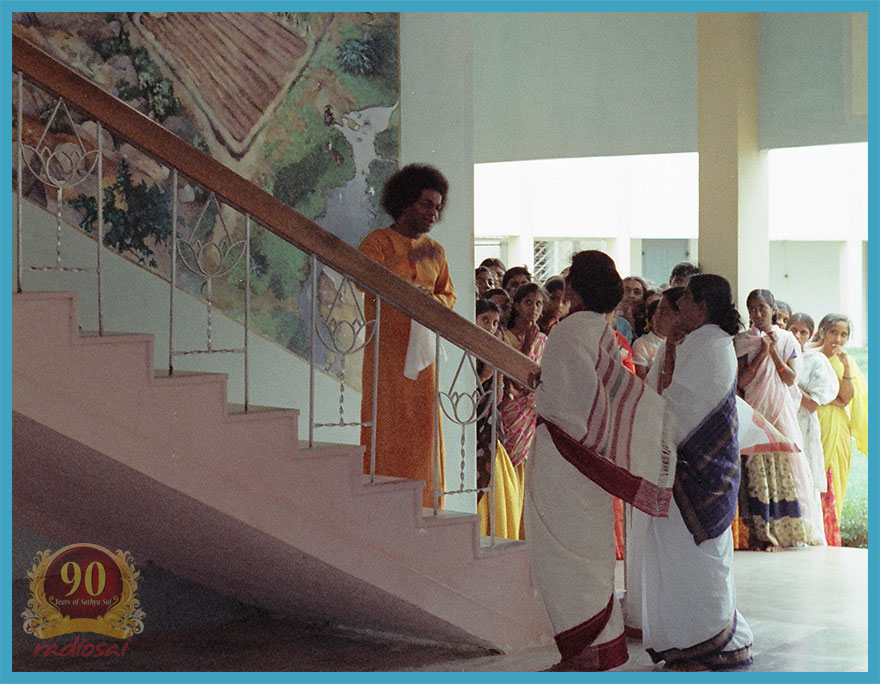 |
In the above clip, Swami clearly explains that the quest at some point must turn inward. We all are endowed with the tool of inquisitiveness. Education nurtures this trait in us and has the ability to give it a direction. But worldly knowledge encourages us to know more about phenomena outside; gather facts and connect them through logic. So, the world declares the one who knows more facts as more knowledgeable. Bhagawan points out, that at some point at least, this inquisitiveness has to be turned within. For, the one who know one’s Self, knows all. In the Upanishadic lore there is this fabulous account of Svetaketu, son of sage Uddalaka, who comes back after 12 years of rigorous education. He left home as an innocent boy of 12, but returns as a learned youth, filled with pride and arrogance that he has in his possession unmatched knowledge. The truly wise father then asks him this simple question, “Do you know That, by knowing which, everything is known?” The son is surprised and humbled. He confesses that he knows not of any such knowledge. He asks the father, how is that possible? How can knowing one lead you to know all? And sage Uddalaka gives a simple explanation. He says, “If you know what earth is made of, you also know at the same time what anything that is made of earth also is made of. So is the case with gold too.” In this manner the wise father, who took upon the role of the Guru, inspires Svetaketu to turn inward and find the essence of all. How fortunate we all are, that Bhagawan has adorned the role of the father-guru Sage Uddalaka and is inspiring us, the proud Svetaketus, to turn our inquisitiveness within?
But is the pursuit of Spiritual knowledge alone sufficient? For instance, we all have heard from Swami a number of times the ultimate Truth that everything is essentially Divine; that we are not this body-mind complex but the Divine-Self that illumines it. Though we know it intellectually why is it that none of us dare to call ourselves Self-realised. Unlike other forms of knowledge, spiritual knowledge is more a state of being. So, apart from pursuing that knowledge, what more needs to be done by the student? It is this most important point Swami elucidates in the following part.
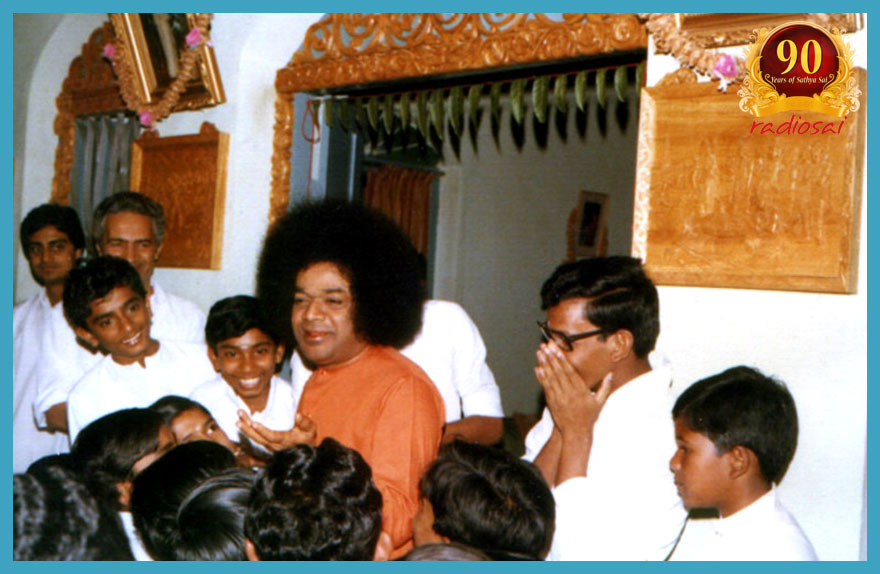 |
Spiritual knowledge alone is not sufficient. Along with it one must also have the power of penance (tapas-shakti). It is the combination of knowledge and tapas that gives one the effulgence and the wisdom. In vidya there are two branches one is avidya or ignorance and the other is Brahma Vidya or wisdom. All that one learns today for the purpose of sustenance and upkeep of oneself, and for getting along in life fall under the category of avidya. This education is directly related to the outer world and our body, and is intended merely to grant authority and skill to all, from the humblest sweeper to the highest king. On the other hand, the sacred divine education is that which gives you happiness and bliss, both in this world and the spiritual world.
But, spiritual education or Brahma Vidya shows you the Para Brahman (Ultimate Divinity), whereas tapas-shakti enables you to merge with it. As the Brahma Vidya gives you the vision of Para Brahman and when in conjunction, Tapas enables you to merge with it, these two are like the positive and the negative. This also represents the coming together of the Divine Atmic energy within and the power of Prakruti or nature for one's Divinity to shine forth.
Knowledge and learning comes from outside, even the spiritual kind. This is like the energy from outside or the power of Prakruti. This should be coupled with the effort that comes from within. Both of these are essential for true wisdom to dawn. But before making that point Swami explains that Avidya or ignorance too is a part of Spiritual Knowledge. Swami terms that knowledge which deals with one’s status and position in life as Avidya. Possibly because this deals with or is based on the principle of multiplicity, which is born of ignorance. Nevertheless, this knowledge too is essential. Swami would tell His students, as long as you live in the world of duality you must fend for yourself and your family, and carry yourself in a manner that befits social living. May be here Swami is giving us a hint as to what is that tapas or penance that Swami was referring to. But we do not have to wonder or speculate, for in the clip to follow, Swami explains what penance must go along with the pursuit of knowledge.
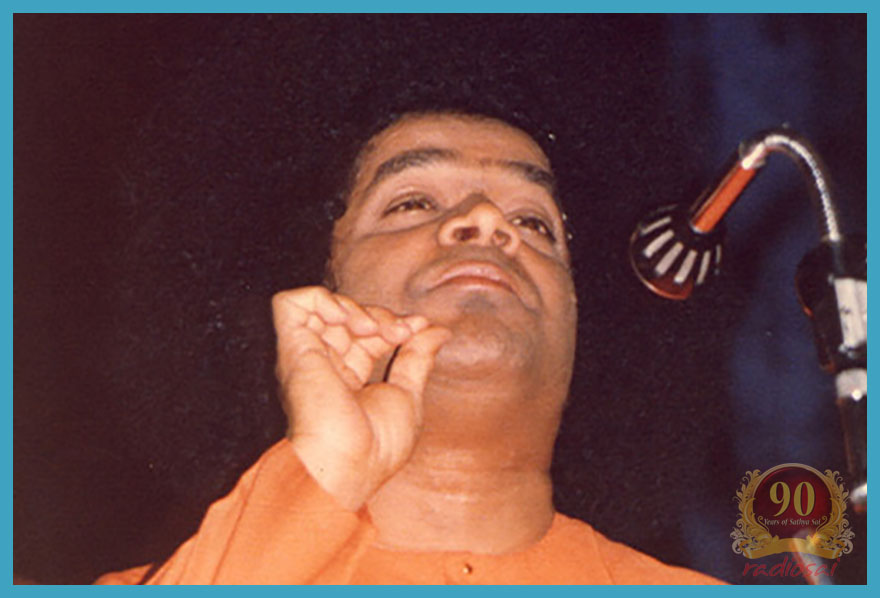 |
Tapas should not be confused with standing upside down or undergoing severe penance and austerities. Giving up all company and associations, going into a forest and living on herbs and leaves cannot be called tapas. Real tapas is the process of purifying these three instruments – Mind, speech and body (or thoughts, words and deeds). To begin with, for the purpose of purifying the mind, one must seek the company of the noble (Sathsangam). To purify speech one must read noble literature. And then, the body must be used for doing good activities. Hence good work through your body, good words through your speech and good thoughts through the mind – these three put together is what essentially tapas is. That is why it was declared, the one whose thoughts, words and deeds are unified, is a noble one, whereas a bad man is one whose thoughts, words and deeds are in disharmony.
Bhagawan would often emphasise two messages through His discourses and writing. One is that we all are Divine, that we all are that Divinity which is beyond all dualities (including the duality of good and bad). The other message is that of goodness. Swami would say, see good, do good and be good. Though there appears to be an apparent disparity between the two, they are like the positive and negative charge that produces illumination. It is that synthesis that Swami was explaining to us through the last two clips. Pursuit of the transcendental cannot be decoupled from basic idea of goodness. But that then leads us to the question, what is goodness in thought, word and deed. In this final clip, Swami crisply explains what it is, which in fact, is the hallmark of spiritual education itself.
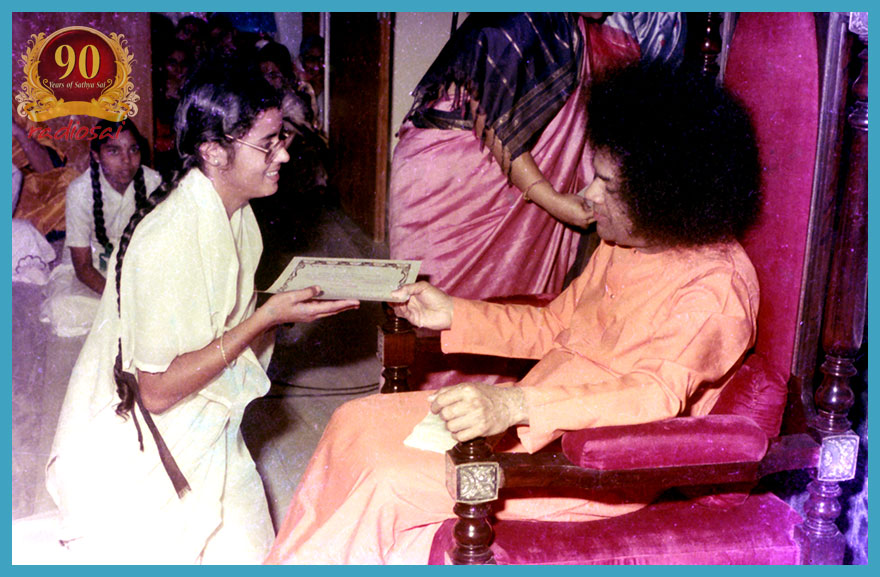 |
All the education of today is only taking the form of ignorance or ill-education. Spiritual education springs forth from the depths of one’s heart and is suffused with Prema or love. Education that is associated with love is spiritual education and the education associated with selfishness is Avidya or ignorance. Where there is love there will be forbearance. Where there is selfishness there is always room for bad qualities. That is why it is said, “Love lives by giving and forgiving; self lives by getting and forgetting.” It is this selfishness that turns man into a demon. So first of all, teachers should make an attempt to put away selfishness and cultivate the nature of helpfulness. Teachers should not look upon their wards as other’s children, they should consider them as their very own. When you show this distinction between your children and your students, this will lead to the students developing a distorted view in their minds. When it comes to good and bad, a teacher should treat all children similarly. Teachers must endeavour to cultivate this equal-mindedness.
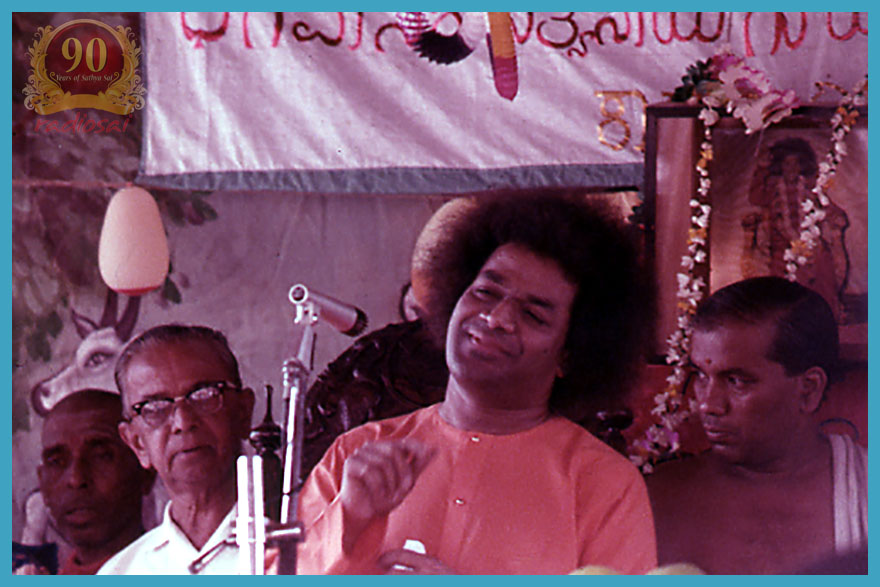 |
Isn’t it abundantly clear from this clip that love in thought, word and deed is what leads to goodness? And selfishness is an obvious sign of evil. But Bhagawan also places the onus for developing these qualities on the teachers and parents. He thereby indicates to us the importance of the role parents and teachers play in spiritual education. And one could say that the role is more significant than in worldly education. But that reference to teachers is also a hint from us as to what you can expect in the following part of this series. We will try and delve upon what Swami had to say about the role of teachers and parents in education, next month, for all our benefit.
- Radio Sai Team
What do you think about this Article? Please let us know by writing in to h2h@radiosai.org or you may leave your thoughts in the comments section. Do not forget to mention your name and country.
| comments powered by Disqus |






